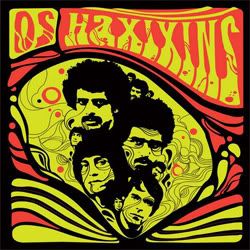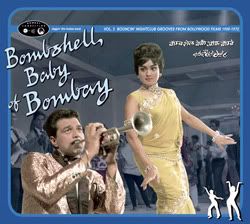 Bombshell Baby of Bombay: Bombay Connection, Vol. 2 - Bouncin' Nightclub Grooves From Bollywood Films 1959-72 (2006)
Bombshell Baby of Bombay: Bombay Connection, Vol. 2 - Bouncin' Nightclub Grooves From Bollywood Films 1959-72 (2006)
It's always interesting to see the ways in which western musical styles manifest themselves in non-western countries. The first volume of The Bombay Connection explored Hindi funk music featured in Bollywood films of the 70's and 80's, and it's an understatement to say that the results were unique. They were also a breath of fresh air to a genre that has not seen much innovation since...well, the 70's and 80's. One needed to look no further than the world's second most populous country for fresh ideas in funk music.
In volume two of The Bombay Connection -- Bombshell Baby of Bombay -- expert crate digger Edo Bouman has again collected an esoteric mix of Bollywood music, this time focusing on swing and rock and roll music created in and around the 1960's. As with volume one, western listeners shouldn't expect anything completely familiar sounding. The sound is laced with various elements of traditional song and instrumentation that have been a staple of Bollywood film music since the advent of "talkies", but it's no less energetic than its western complement.
The most accessible song of this collection is given to us by Mohammed Rafi -- "the voice of Indian rock n' roll". "Jan Pahechan Ho" has already been brought to the attention of western listeners through the movie Ghost World, which is why it's better known to some as "the song that Thora Birch's character was rocking out to during the opening credits". With a memorable surf riff and an absolutely killer brass section, it's easy to see not only why it was chosen to open the film, but also why it's included on this compilation. Rather than give more of the same, Bouman goes for variety. "Ek Bottle Hogal Mein", Kishore Kumar's drunken ode to booze, incorporates a mildly middle eastern feel to the mix, while Asha Bhosle's "Sambhalo Sambhalo Apna Dil" brings a bit of a Latin flavor.
There's something about Bollywood movie theme songs that are just more fun and appealing than those of Hollywood. Perhaps it's nothing more than the fact that the western-style compositions are familiar to me and their Hindi counterparts are not. Either way, it makes me want to familiarize myself with the films more so than the five minute "Indian Superman" clip I've seen on Youtube.
Score: 8/10
"Jan Pahechan Ho" by Mohammed Rafi (composed by Shankar-Jaikishan)
"Pretty Pretty Priya" by Anand Prayag & Chorus (composed by Kalyanji-Anandji)
Monday, March 30, 2009
Bombshell Baby of Bombay: Bombay Connection Vol. 2 (2006)
Friday, March 27, 2009
Love, Peace & Poetry: Turkish Psychedelic Music (2005)
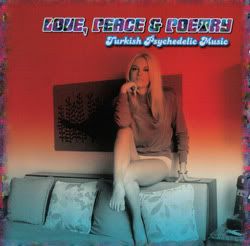 Love, Peace & Poetry: Turkish Psychedelic Music (2005)
Love, Peace & Poetry: Turkish Psychedelic Music (2005)
I didn't really notice how criminally absent Turkish music was from my collection until I heard this album; or how little I knew about Turkey as a country; about its history and its people. With the ninth installment of the Love, Peace, and Poetry compilation, which explores obscure world psychedelic music, Normal Records and QDK Media have opened my eyes. Does that mean that, thanks to this compilation, I can now give you a detailed synopsis on Turkish history, pop culture, and current events? Nope, but I can damn sure assume that their musicians in the 70's must've had some pretty potent drugs at their disposal.
Though the album is subtitled Turkish Psychedelic Music, the songs on here can more accurately be described as Anatolian rock, which was the name given to music that fused traditional Turkish folk with Western-style rock. Despite following in the footsteps of popular American and British psych bands, the songs on this compilation, with its infusion of traditional Eastern instruments, is actually more deeply representative of what most people today would classify as true psych rock. It's hard to argue this when listening to songs like "Yağmur" by Erkin Koray -- an artist that the liner notes calls "the most psychedelic rocker ever from Turkey" -- or the lead-off track "Bundan Sonra" by Selda, who contributes to two songs to the compilation. Her other song, "Ince Ince Bir Kar Yagar", is my favorite track on the album. It's a traditional türkü arrangement with strong political lyrics that I don't understand a word of, but the emotion of her often harsh delivery easily gives away the songs' urgent and deeply personal tone, which somehow allows me to look past the grating quality of the vocals.
Overall, this Love, Peace and Poetry collection should appeal to any fan of psychedelic music. It's a collection of music so strong that it's singlehandedly sparked my interest in the culture from which it came. Another demonstration of the power of music, I guess.
Score: 8.5/10
"Kara Yazi"
"Ince Ince Bir Kar Yagar"
Wednesday, March 25, 2009
Digital Good Time: "Fur In My Cap"

(Digital Good Time is a feature in which xoxobra focuses on the visual side of music)
If you've payed attention to the videos I post on this feature, you may notice my tendency to post videos that take a relatively simple concept and use it in a creative or funny way. The technique used in Rob Roy's "Fur In My Cap" should be nothing new to those familiar with Late Night with Conan O'Brien and his mock via satellite interviews with the likes of Martha Stewart and Arnold Schwarzenegger, which used still pictures of the celebs with the mouth masked out and layered it on top of live video to simulate talking. It was fucking hilarious, and seeing this video made me wonder why the effect hasn't been used more often.
Though precise technical proficiency isn't required to pull this off successfully, the director, Ethan Lader, did a pretty good job of matching the lighting and angle of the mouth with that of the still picture. My only complaint (besides the painfully average song) is that he didn't expand more on the other animated elements, such as the bicycle wheels at the beginning. A few more embellishments like that could've made a good video excellent. But still, he's a talented director and this one's worth checking out.
Links:
Ethan Lader
Rob Roy
Monday, March 23, 2009
Khanate - Clean Hands Go Foul (2009)
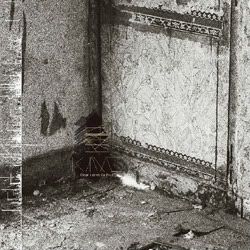 Khanate
Khanate
Clean Hands Go Foul (2009)
Khanate's sudden disbandment in 2006 was a blow to the drone doom metal world; a world not particularly large in the first place, but also one not particularly diverse. This is precisely why Khanate stood out so easily. With metal veterans like James Plotkin and Stephen O'Malley (of SunnO))) fame; a household name to some) working with a vocalist of Alan Dubin's caliber, they were bound to reach heights not easily accessible to their peers. Sadly, we only got three proper albums from this venerable supergroup of sorts before...actually, wait...make that four.
Information on Clean Hands Go Foul -- whether it is an official release or a collection of b-sides, outtakes, etc. -- is hard to come by. The most definitive definition seems to call it the "long lost" Khanate album, possibly not originally meant to see the light of day. If that's the case, it makes their break-up all the more infuriating, as even their throwaway material trumps most of what you'll ever hear from drone doom. "Wings From Spine" is probably the most immediate the band have ever been, finishing the track in a brisk (for them) sub-seven minute time-frame and establishing the dark, catastrophic feel the band is known for. Alan Dubin's voice is once again the centerpiece of this sound; his deranged shrieks and growls adding immeasurably to the unbalanced nature of the music.
Some have complained about the Gollum-ish quality (as in the Lord of the Rings character) of Dubin's vocal style, which is a good way to put it even if it is meant to be belittling. But it's still so captivating to listen to that I was convinced that he could carry an album on his voice alone. "Every God Damn Thing" did a good job of proving me wrong on that. A 32-minute so-called "diss track" with sparse instrumentation and electronic buzzing noise, Dubin more or less carries the track, and the results are pretty boring and meandering. There's a glimmer of hope at about twenty-one minutes in where some guitar pops in and it seems things will finally take off, but as quickly as it comes it goes away, and ends up serving as a colossal middle-finger to anyone patient enough to listen up to that point.
Initially I felt that this song was a terrible way for the band to close out their career with, but in retrospect, maybe it isn't. If anything, it makes the me better appreciate the contribution of the guitar and drums, and the atmosphere they create that makes Dubin's vocals so unsettling. But either way, the album could've done without the song.
So long Khanate; you will be missed.
Score: 7/10
"Wings From Spine"
Friday, March 20, 2009
Os Haxixins - Os Haxixins (2009)
If there's one age-old query that can be answered by listening to Os Haxixins' self-titled debut, it is this: what happens when a group of stoners get their hands on a vintage organ? Welp...here ya go! Add in some vintage amps, guitars and lo-fi recording equipment and you have yet another band that was formed forty years too late. They certainly aren't the first band to follow this trend but, considering my favorite album last year was from the Swedish psych band Dungen, this is one trend I personally don't mind bands following.
With a look as vintage as their sound, Os Haxixins made a name for themselves playing around São Paulo for four years before they got around to actually recording. Originally release as a vinyl-only album in Portugal in 2007, this CD reissue comes to us courtesy of Pittsburgh's Get Hip Records, complete with two bonus tracks (the instrumental "Raios" and "Please Forget", one of three English language tracks); but unfortunately absent of any clues as to how to actually pronounce the bands' name. Few things make me feel so incredibly gringo than trying to say it without struggling, but I've settled on either "os hazizins" or "that one Brazilian band I've been listening to". Both seem to get the point across.
Though there are certainly psych elements to Os Haxixins sound, the fuzzed out guitars, slightly muffled vocals, and catchy two-minute song structures place them more in garage rock territory. And as discussed, all of the songs, for better or for worse, are dominated by the organ. This isn't necessarily an automatic flaw as they actually use it quite well most of the time, adding a dimension to their sound that many similar bands lack. They can rock out with it, as they do on the opener "Onde Meditar (Imi-dà)" and on the excellent "Àcido Fincado", or they can do a more laid-back, spy music feel, as on "Depois Eu Volto (Gimme)". But their options, or perhaps just their ideas, are somewhat limited with the instrument, and throughout sixteen tracks of organ onslaught, it starts to sound a little redundant.
Overall, though, Os Haxixins is a pretty enjoyable listen that's true to the band's garage rock influences: fun, fast and loud, even if lacking a little depth.
Score: 7/10
"Depois Eu Volto (Gimme)"
"Àcido Fincado"
Wednesday, March 18, 2009
No one watches the Watchmen...title sequence.

In this space I had originally hoped to post the opening credits to the new Watchmen movie (which I've seen twice as of this writing, and I very rarely see movies twice). The six-minute sequence, designed by the film's director Zack Snyder with help from visual effects studio yU+Co, is a stunning montage consisting of layers of still imagery mixed with subtle movement and 3D effects, set to the Bob Dylan song "The Times They Are A-Changing". While it's essentially an animatic with gorgeous cinematography, the sequence works so well at establishing the mood of the movie, and contains a lot of easter eggs for fans of the comic. It's one of the most effective title sequences I've seen in a long while.
Maybe you've heard about it already, and that's because it's awesome. Many felt it was the best part of the entire movie. I'd love to be able to embed the sequence so you can bask in all its glory (if you haven't already), but unfortunately the sequence, originally available to view online on yU+Co's website, has been taken down due to pressure from Warner Bros Pictures and is now nowhere to be found online (at least not for long). I could complain about this further, as many have already done in various spaces online where the video used to be posted. I could argue about free publicity and the power of the internet. I could post or embed a link to the latest source to carry the sequence knowing that it will be obsolete in no time. But nah, I think most of what's been said about Warner Bros' ridiculous decision to block this small section of the film from being seen outside of a theater (not to mention denying yU+Co, the effects company who helped created it, the right to proudly display their project) has already been said. I'm just posting this to let them know that I agree with them.
Links:
yU+Co
Motionographer article on the sequence
Monday, March 16, 2009
Discovering the Classics: 1988 Hip-Hop Edition
(With Discovering the Classics, I chronicle my exploration of a variety of classic and influential albums that, for whatever reason, I had never heard before. Lately, my focus has been on old school hip hop. 1988 was a very big year for hip hop [many would out it only behind 1994 and 1987 as the best overall year for the genre], and I happened to have four albums from this historic year to review at the same time, which I've decided to condense into one mega-feature.)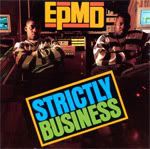 EPMD
EPMD
Strictly Business
Three signs I'm getting old:
1) I complain to my neighbors when they play their music loud (some people still have jobs to go to in the morning, ya know).
2) I don't understand people who wear headphones EVERYWHERE, like in a grocery store or at a restaurant (do you really need a soundtrack while shopping for frozen pizza and fucking Oreo's?).
3) I'm thoroughly annoyed by Eric Sermon's poor enunciation on some parts of Strictly Business. I mean, there's nothing wrong with his actual rapping, but goddamn, can that dude learn to separate his syllables a little better? Sweet Jesus. He tries to say "EPMD mania" and it comes out more like "eeppeeehdeeanya" or some shit. Sure, he's the greatest and most influential mind in hip hop history, but he must've had a lot of trouble in high school speech class. Goddamn whippersnappers.
That aside, it took me a while to appreciate this album, but when it finally clicked, it clicked hard. Top-notch production; every beat on this album kills.
"Let the Funk Flow"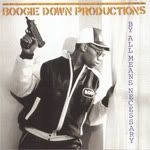 Boogie Down Productions
Boogie Down Productions
By All Means Necessary
I have a love/hate relationship with KRS-One...or, probably more like/dislike. He has a commanding and proper delivery to his rhymes that sometimes I can tolerate enough to enjoy and other times grate on my nerves, partially because they can sound so dated. But maybe that's just me. One of the only flaws with By All Means Necessary is that the beats tend to meander at times. KRS handled the production (taking over for the late Scott La Rock) and he does a nice job for the most part, but some songs, like "Stop the Violence" most notably, are probably at least 45-seconds longer than they needs to be. That aside, this is every bit the hip hop classic as advertised. Hearing "Jimmy" sort of upset me though because it suffered such a horrible mangling of a sampling by Puff Daddy (for his 2001 single "Diddy"), in the same way that EPMD's "Let the Funk Flow" was mangled by Nas in 1999 (for "Nastradamus").
"Illegal Business"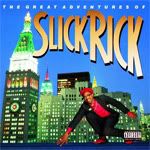 Slick Rick
Slick Rick
The Great Adventures of Slick Rick
If there's one thing to dislike about this album, it's the misogyny. Not like that's a new phenomenon in hip hop or anything, it just doesn't seem right coming from Slick Rick, who comes off more like an eccentric yet interesting weirdo than anything. Even still, it's hard not to like this album full of storytelling raps. It's too bad that he didn't have a more fruitful recording career. Following the release of this album, he got into a series of legal incidents that put him behind bars and he never quite recovered. Shame. He has probably the most distinctive voice in hip hop, and it would've been nice to hear it on another album that...you know, didn't suck because it was rushed out between stints in prison.
"Hey Young World"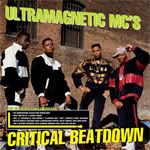 Ultramagnetic MC's
Ultramagnetic MC's
Critical Beatdown
Holy crap, Ced Gee raps SO FUCKING HARD! It's hilarious as shit. It's like his whole approach to rap is to make up for what he may lack in lyrical skill by just emphasizing like every other syllable, as if in response to someone coming up to him and criticizing him for not being ultramagnetic enough and he's all "Oh YEAH, I'LL SHOW YO ass who's ULtramagNETIC!".
So essentially he raps like a 13-year old girl types on the internet yet somehow it works for him. Yeah, many people view this albums' place in rap history as not much more than a coming our party for Kool Keith, and yes, Kool Keith does drop some good rhymes, but Ced Gee is the highlight for me. He just starts hype and gets more hype as the album progresses. The album actually gets a little boring in the middle with the cluster of Kool Keith solo tracks. I don't know if the Ultramagnetic MC's have ever done a soft song (certainly not on this album), but I would love to see what he sounds like in one. "I really MISS my HOmies EVEN THOUGH THEY gone AWAY! I KNOW YOU in a BETter PLACE! and I HOPE to SEE you SOON one DAY!" It'd be the most hype street ballad ever.
"Ego Trippin'"
Friday, March 13, 2009
The Watts Prophets - Things Gonna Get Greater (2005)
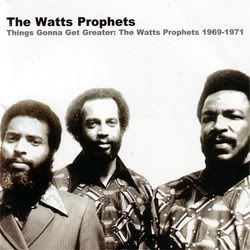 The Watts Prophets
The Watts Prophets
Things Gonna Get Greater (2005)
It doesn't matter if you agree with the politics of the Watts Prophets. It really doesn't. Partly because they probably wouldn't care what you think, and mostly because nitpicking their politics is missing the point entirely. I could go on for days about the sense of paranoia or the contradictions of what they discuss (by their definition, the only truly black people on earth can be narrowed down to themselves and Malcolm X, and even adding themselves to the list raises some doubt in their minds). I could sit here and be offended about the fact that they have nothing good to say about me, my college education, my support of birth control, my natural hair, or especially my white wife, but I realize that none of that matters here.
Things Gonna Get Greater is a compilation of the Watts Prophets' first two albums: 1969's On the Street in Watts, and 1971's Rappin' Black in a White World. Both albums are excellent (for the record: I slightly favor the ladder, though the former seems to get more praise). Together they are almost overwhelming. Often complimented with a light backing of jazzy bass, bongos and trumpet grooves (with some piano and a Capella melodies), the Prophets deliver poems filled with emotion and frustration of the world around them; perfectly encapsulating the anger that must have existed in the time period leading up to, during, and following the Watts Riots of 1965. Regardless of the conclusions they've drawn, their anger is justified. It is as real as the poverty and brutality faced by the black community in 1960's Watts, and it makes for one of the most intense listening experiences of my life.
This is not just an album, it's a historical statement. It should be required listening to black history departments in liberal arts colleges nationwide. It does not matter if you agree with all of it. I don't agree with much of it. But taking offense to it isn't constructive because it clouds the very real frustration from which this was born. Enjoying this album is not an endorsement of everything the Watts Prophets stand for, it's simply evidence that you still have the ability to appreciate a work of art when presented with one.
Score: 10/10
"Dem Niggers Ain't Playing"
"Part-E, S"
"Black Pussy"
Wednesday, March 11, 2009
Digital Good Time: "Divinations"

Nearer to the release of the album, I'll prepare a Digital Good Time feature on the man responsible for Crack the Skye's cover art, Paul Romero. Trust me when I say he's one of the best in the business.
Links:
Mastodon
Crack the Skye
Monday, March 9, 2009
My Love/Hate Relationship with Amoeba.
Now that I've done so, I've decided that I have a love/hate relationship with Amoeba. I love it because of it's selection. Whereas most independent record stores are located in small, old buildings with creaky floors and layers upon layers of posters on the wall, Amoeba stores are located in warehouses with square footage that could fit several of those old record stores inside it with room to spare. The rock section alone dwarfs the size of most indie record shops' entire catalog. Even the most rare of genre's are given a fair amount of attention. Most of my time was spent in the international section, where I was able to find a few albums in store that other record stores would never bother to carry (Bollywood, holla!). Yet this is the same reason why I hate Amoeba. It's like the Sam's Club of independent record stores. There's no ambiance, and the customer service has more of a post-office feel to it. Of course, the droves of hipster douchebags there don't really help things either.
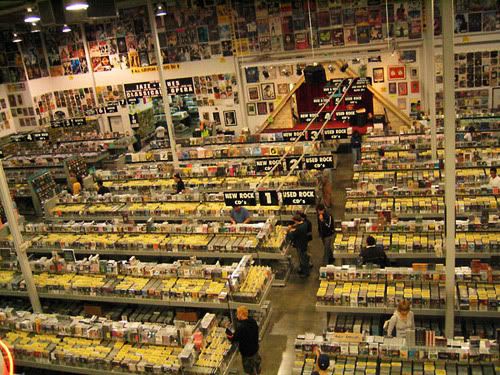
(Inside Amoeba Hollywood, minus hipster douchebags)
I prefer the Aquarius Records or Shake It Records kind of record store. Yeah, my foot could probably crash through their floors on any given step, but I'd take that chance any day if it means going to a cozy store with inadequate heating and cooling systems and a robust selection of rarities that the cashier/owner can tell you just about everything about. Still, if they opened an Amoeba in Phoenix, I wouldn't complain.
Links:
Amoeba
Friday, March 6, 2009
Analyzing Outkast: The Dilemma of a Popular Black Artist
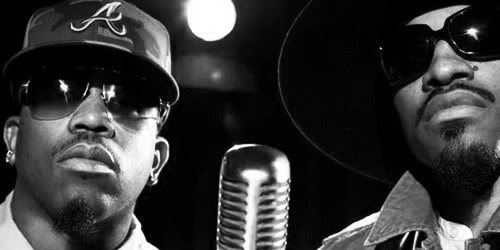
I remember watching Outkast on a since canceled HBO show called Reverb. Filmed during a 1999 tour, it was about a year before the release of their critically acclaimed album Stankonia. During one segment, they put on a concert and were surprised to be performing in front of a predominantly white audience. "I didn't know that many white cats were into this" was roughly how I remember Big Boi reacting to it during the interview portion. It was during a time where a considerable shift was happening in hip hop where the music was becoming less and less a part of black culture alone and more apart of overall pop culture. Of course this had been going on for a long time to some scale, but around this time it was becoming more and more apparent. Hip hop was now a highly profitable business, having gained nationwide acceptance from mainstream audiences. Entire crews were being signed left and right and began dominating music charts until it no longer was uncommon for many, if not most, of Billboard's top ten bestsellers to be hip hop.
It didn't happen overnight exactly, but based on Big Boi's reaction you might've thought that it did. In a later interview, he talked about the upcoming release of Outkast's NOT-A-GREATEST-HITS-ALBUM greatest hits album Big Boi & Dre Present..., where he explained (on top of reiterating that it wasn't a greatest hits album) that it was for people who may not know what Outkast is about. If pressed, he might've further explained that it was for fans who came on board after the release of Stankonia. After all, "B.O.B", 'Ms. Jackson", and "So Fresh, So Clean" were pretty huge hits, and the album even earned them a Grammy nomination, so more people were paying attention to them than ever. But listening to him, and remembering that episode of Reverb, you could pretty much tell that by "people who may not know what Outkast is about" he probably meant white people.
During the recording of Stankonia, Big Boi and Andre reportedly weren't really listening to rap much, as the genre "was getting real comfortable". But I imagine that some dilemmas arose. I vaguely remember reading about the disagreements between the two ("Niggas don't like when you change your voice like that") and how that led to the solo albums three years later and the long period of inactivity as a duo since (minus the Idlewild movie soundtrack), but I can't help but wonder how it came to that.
My assumption comes down to fame; the typical tortured rock star thing (although maybe not as cut-and-dried). The realization of how big they were becoming. The awards and nominations and the attention that followed and the pressure that came with knowing that more people than they originally thought were paying attention. From that one reaction on Reverb, I gather that Big Boi was probably the most conflicted (or at least the most obviously conflicted, since Andre doesn't seem to be into interviews as much). He wanted to keep the music innovative and fresh but still appeal to his original fanbase: whom he might assume was predominately black.
Don't worry, I'm not going to get into a discussion about selling out, as I don't think it applies here and because I feel that it's a shallow area of discussion to begin with. I'm more interested in analyzing how some black artists deal with fame and why.
Big Boi's mindset was probably along the lines of hip hop trio The Perceptionists. During an interview with URB Magazine in 2005, the group commented on their mostly white audiences at shows:
"Now everyone is welcome to any show we do, and we want people of all colors to be there, but it's not fair that promoters are setting it up so only white kids come to the show....Hip hop was started in the ghetto...it wasn't shows with 600 white kids in college. The passion of being broke and trying to survive in the city - that's what hip hop is. So if all the fans of that type of music are people who can't relate to the struggle, it becomes fraudulent."
The dilemma of a black artist with a predominately white fanbase isn't often spoken about aloud by the artists themselves, and with good reason: it alienates a huge chunk of their fanbase based on skin color and more or less amounts to career suicide. Of course, that's assuming that all of them feel that way, which I'm sure is not the case. But still, it's not very uncommon for black artists to be thrown for a loop when the idea of who they think they are appealing to is different from who they actually are appealing to. The 2007 biopic Talk To Me, starring Don Cheadle, explored this exact dilemma: where a popular inner-city DJ begins to get national recognition only to leave it all behind and return to his roots in local radio. A few years ago, comedian Dave Chappelle famously broke a $50 million contract with Comedy Central, retreated to Africa, had his sanity questioned, and later returned to pick up his career in small comedy clubs where he started. Around the same time, cartoonist Aaron McGruder, who's famed Boondock's had exploded onto comic strips in newspapers across the country, had his creation picked up for a cartoon series, which ran with critical praise for a short time before he suddenly called it quits (PopMatters ran an excellent article regarding Chappelle and McGruder's decisions).
Of course, some black artists get over it and enjoy the ride. Last year, Public Enemy performed their militant breakthrough album It Takes a Nation of Millions to Hold Us Back in it's entirety in front of a predominately white audience at the Pitchfork Music Festival (one picture I found online taken within fifty feet of the stage had a surreal frozen image of white fists pumping in the air). Individually, Flava Flav has resurrected his career by exploiting his caricature, which was enough to earn him a couple of television shows and a roast on Comedy Central. But others don't adapt so easily. Jason Tanz wrote in his 2006 book Other People's Property: A Shadow History of Hip Hop In White America about being in the predominately white crowd at a Digable Planets concert in the 90's, where the front woman ad-libbed an anti-establishment lyric from one of their songs, saying "93 million miles above you devils" (referring to the largely white audience who paid to see them) rather than the original lyric of "these devils". I suppose the audience matters to some because it subconsciously changes the way they think about how the artist views or approaches their art. As Dave Chappelle put it: "The bottom line was: white people own everything, and where can a black person go and be himself or say something that's familiar to him and not have to explain or apologize?"
I can't help but listen to Stankonia and feel this dilemma playing a role in the sound of the music, with Big Boi trying to keep it true to their origins while Andre longs to push the envelope even further, and trying to find that balance between being innovative enough to satisfy themselves artistically (and thus appealing to a so-called "backpacker rap" crowd) while still, for lack of a better term, keepin' it real. Basically, Outkast had changed with that album. And though this could be for any number of reasons, creative or otherwise, I can't help but feel that that one Reverb interview, that one tour and Big Boi's reaction, played some role in the recording of Stankonia and all of what happened with the duo afterward, the years of relative inactivity and series of broken new album promises included. Maybe we'll never know exactly why, but at this point all we know for sure is that they haven't been the same since, which has been quite a loss to the music world as a whole. Here's hoping that 2009 is (as 2008 was supposed to be) the year they settle this dilemma.
Wednesday, March 4, 2009
...And You Will Know Us By the Trail of Dead - The Century of Self (2009)
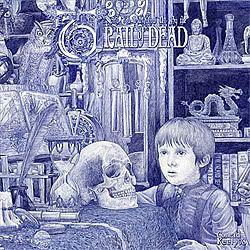 ...And You Will Know Us By the Trail of Dead
...And You Will Know Us By the Trail of Dead
The Century of Self (2009)
So....how 'bout those Detroit Pistons, eh (stay with me, non-sports fans)? Admittedly not a team I payed a lot of attention to before the 2004 NBA Finals, where they faced off against a juggernaut of a Los Angeles Lakers team, which featured arguably the greatest coach (Phil Jackson), center (Shaq), clutch shooter (Robert Horry), and post-Jordan all-around player (Kobe) all on the same side (well, for the most part). The debate surrounding the matchup wasn't so much whether the Lakers could capture their fourth title in five years, it was how many games it would take them to do it. The Pistons, however, had other ideas. They not only beat the Lakers, they methodically destroyed and embarrassed the Lakers to such a degree that it prompted one journalist to refer to the series as "the five-game sweep" (the Lakers barely eeked out one win thanks to the last-second heroics of the aforementioned Robert Horry). Almost overnight, everybody in the NBA was paying attention to the Detroit Pistons.
The Pistons weren't by any means a flashy team with any outstanding players doing exciting things, they were average or above average players who happened to be outstanding when together. After the Pistons carried their momentum all the way to the seventh and final game in the next years' NBA Finals (where they fell to the Spurs), the next two off-seasons would see them lose both their head coach and star center respectively, something they never quite recovered from. And while they were still winning games and having flashes of brilliance, they had gotten noticeably comfortable and complacent, failing to turn it on when they had to. They often appeared so bored with the idea of a basketball regular season that they hardly seemed to care by the time it mattered most: the playoffs. Today, the Pistons are becoming farther and farther removed from the days among the Eastern Conference's elite teams, so thoroughly muddled in an obvious period of transition and rebuilding that only a glimmer of their past glory remains while a hope for future dominance is on the horizon; though at this point, just barely so.
I don't really have to spell this out for you, do I?
If I were to grade The Century of Self on its first fourteen minutes, I would be hailing the bands' sudden return to form, praising them for successfully melding the energetic songs of their past with the bloated, often melodramatic arena rock sound they've attempted on their more recent efforts. Following the buildup track, "Giant Causeway", "Far Pavilions" sounds plucked straight out of the Madonna/Source Tags-era of their career; the loud-soft-loud dynamic pulled off as successfully as they used to do it (before the soft parts started feeling like awkward, confused transitions to extend the song length). The album then jumps straight into the dramatic magnum opus "Isis Unveiled". I'll spare the fancy wording: this song fucking kills. Yeah, it sounds suspiciously Muse-like (I spy a "Knights of Cydonia" inspiration), but it makes up for any faults with sheer aggression. This is the least lethargic they've sounded in years.
But the album goes on, and proceeds to hit an immediate road block in "Halcyon Days", which isn't a bad song, but feels right on par with Trail of Dead's recent output -- and as you can guess, this isn't a compliment. Luckily, the band gets things rolling again with a trio of good tracks in "Bells of Creation", "Fields of Coal", and "Inland Sea". With these songs ("Fields of Coal" most notably), it's obvious the band, of which the founding members are now well into their 30's, have somewhat regained that certain youthful energy that seemed to drive their earlier work. They're having fun playing again, and I feel young again listening to them.
Regrettably, they can't keep it up to close the album. With a series of forgettable tracks (save for "Luna Park", which is memorable only because it's the most obvious failure: an attempted piano-driven soft-rock ballad), The Century of Self ends with a bit of a whimper. In the end, it's hard to classify whether this album is a success or not. It's most definitely better than their last album, So Divided, and many would agree that it also tops 2005's World's Apart (I'm one of the few that would debate this). It certainly isn't Source Tags & Codes, but at this point no rational person expected it to be so.
My personal vote is to consider it a marginal victory. So Divided was a mess so difficult to defend that I was ready to give up on the band altogether. With The Century of Self, they've shown enough progress to convince me to stick with them through their arduous restructuring process. Like the Pistons, I'll continue to watch their development and hope for the best, but I'll be less surprised if they don't come through when the game's on the line. There's always next year, anyway.
Score: 6.5/10
"Isis Unveiled"
"Fields of Coal"
Monday, March 2, 2009
Good Songs: February 2009 Edition

(A quick recap of some of the best songs from albums I reviewed in the month of February [or heard and will soon review].)
I hope to post my review for this band's new album, The Century of Self, later this week. But one thing it certainly has going for it is the epic "Isis Unveiled", possibly one of the best songs they've recorded in years despite the fact that it's a little Muse-ish.
"New Africas pt. 2" by Buraka Som Sistema
A bit of a departure from the rest of the album, yes, but this darker, dub-inspired track was just what Black Diamond needed to save it from rave music monotony. The album was okay as is, but it might've been better with a few more songs of this style.
"Gutter Tactics" by Dälek
The title track was easily DJ Oktopus' greatest achievement on their recent album, Gutter Tactics. Imagine a rap remix of a Sunn O))) song, and then imagine that it doesn't suck, and you more or less have "Gutter Tactics".
"The Beacon" by Ocean
Thirty-five minutes of completely suffocating doom that actually maintains the listeners interest pretty well. The female vocals add a nice, delecate touch to the otherwise brutal atmosphere.
(excerpt)
"Àcido Fincado" by Os Haxixens
Certainly anyone who doubted the possibility of rocking-the-fuck-out with an organ and tambourine will stand corrected after one listen to this song by Brazilian garage rock band Os Haxixens. I'm still working on the review for this one, but the preliminary consensus is on the positive side.

